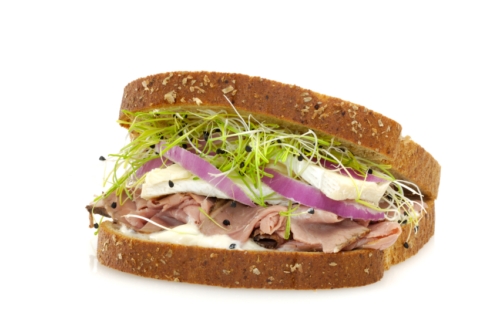
There are currently two foodborne outbreaks going on that have been linked to alfalfa sprouts. As tends to happen whenever sprout-related outbreaks occur, there have been numerous calls for warning labels to be placed on these pieces of produce. Even NPR has gotten in on it. While the logic behind this call makes sense to a certain degree, it misses the larger point and errs on the side of sensationalism instead of science and statistics.
First, it helps to explain why sprouts are getting singled out here. Any form of sprout, whether alfalfa, radish, mung bean, or other, needs warm, humid environments to grow.
These are also the preferred environments of many bacteria, including salmonella and e. coli. Although testing and sanitization procedures are used during production, the process is not foolproof.
The fact that most sprouts are eaten raw does not help much, either. As a result of these factors, some retail chains like Kroger have stopped stocking sprouts.
However, looking at the stats shows that these measures might be based more on paranoid lawsuit-avoidance rather than, as Kroger put it at the time, “thorough, science-based” review.
The CDC has a very handy tool in the form of the Foodborne Outbreak Online Database, which also goes by FOOD—cute.
You can search it by specific foods and ingredients and a quick search for “sprouts” shows that, from 1998 to 2014, there were 49 outbreaks connected to sprouts that resulted in 1,737 illnesses, 178 hospitalizations, and 3 deaths.
While these are clearly undesirable numbers, on their own they don’t give any context as to whether they are more or less risky than any other form of food. Fortunately, we can check this.
Searching another category of produce, such as “fruit” shows 196 outbreaks, 6,357 illnesses, 139 hospitalizations, and two deaths over the same period. Looking up “apple” shows 49 outbreaks, 1,431 illnesses, 80 hospitalizations, and seven deaths.
For a real whopper, look up “potato” to find 310 outbreaks, 10,285 illnesses, 215 hospitalizations, and five deaths. Or perhaps “lettuce”, for 324 outbreaks, 8,387 illnesses, 440 hospitalizations, and three deaths.
There are, obviously, many other foods—berries, for instance—that have lower outbreak stats than sprouts, but the purpose here is to show that they are not some abnormal outlier that poses an undue risk to an unaware populace.
Clearly, a certain level of caution and protection is needed when dealing with sprouts, just as when dealing with any raw fruit or vegetable. Wash them well, ideally cook them, and if you want to be extra cautious, don’t serve them to anyone with a weakened immune system.
Or you could move to Texas, Oklahoma, or Delaware, since FOOD shows that they’ve never had a sprouts-related outbreak.
Sources:
“FDA Investigates Multistate Outbreak of Salmonella Muenchen Linked to Alfalfa Sprouts Produced by Sweetwater Farms,” U.S Food and Drug Administration web site, February 23, 2016; http://www.fda.gov/Food/RecallsOutbreaksEmergencies/Outbreaks/ucm487329.htm#problem, last accessed February 26, 2016.
“Foodborne Outbreak Online Database (FOOD Tool),” Centers for Disease Control and Prevention web site; http://wwwn.cdc.gov/foodborneoutbreaks/, last accessed February 26, 2016.
Leschin-Hoar, C., “Should Sprouts Come With A Warning Label?” NPR web site, February 25, 2016; http://www.npr.org/sections/thesalt/2016/02/25/468032778/should-sprouts-come-with-a-warning-label, last accessed February 26, 2016.













